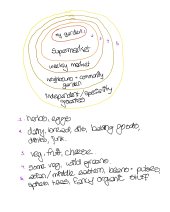This is a response to Paul's recent podcast with our friend Daniel Hatfield from Australia.
http://www.richsoil.com/permaculture/1466-128-rocket-mass-heaters-money-and-permaculture/
They talk about a lot of great stuff, including our (Ernie and Erica's) upcoming visit to Australia. Yay thoughtful conversations! And of
course I want to chime in.
Around the middle of the podcast, they got into the idea of 'Mollisonian'
permaculture. Specifically, they start discussing whether it's OK to jump-start your
permaculture by using non-permaculture methods like chemical fertilizers or fossil-fueled pumps. Daniel says
Bill Mollison is generously allowing a lot of people to call things '
Permaculture' that don't 100% follow the book; this may include compromises with commercial or industrial techniques.
Paul says he may not be OK with this. Specifically, Paul doesn't like the idea of ever using
petroleum products on soil - but Paul freely admits that his WOFATI design calls for petroleum-based waterproofing materials.... just a lot less of these materials than would be involved in a conventional home. (But they do have to be new, or their leak-proofing abilities are pretty useless.)
Ernie and I have a similar choice to make around boat materials: is it more
sustainable to use plywood made with sustainably-grown small
trees but petroleum-derived glues, vs. trying to find straight-grained old-growth lumber for traditional boatbuilding?
And with
Rocket Mass Heaters: are we betraying the concept if we use new materials, vs. waste-stream materials like scrap metal and reclaimed brick?
Is it OK to use 'less' of a bad thing?
How much is counts as 'sustainable' or 'permaculture'?
- Appropriate design has to include a lot more context than it does theory. If the question is, "Is it ever OK to use chemicals in permaculture?" I would need more information before I would
answer.
If 'chemical' means applying persistent pesticides or salts in a manner that hurts your soil more than it helps, there's no point.
How about 'chemicals' extracted through mining or drilling from natural sources? That could include
tractor fuels for keyline plowing, or the H2O that's extracted from
local underground aquifers.
Ongoing application of all the above chemicals isn't sustainable. But I think a lot more permies are going to be comfortable with temporary
irrigation to establish shade trees, or temporary plowing to establish adequate groundwater supplies. than with 'temporary' DDT to nuke-and-pave a pest-free design zone.
- Is permaculture really harder than the supermarket lifestyle?
Change is hard.
Living sustainably is a lot easier once you know how. The transition and learning curves can be painful, especially if forced.
Changing your lifestyle is the hardest part, especially if you aren't cutting yourself any slack about how fast you change.
Is it really easier to find the car keys, drive to the store for BisQuick, wait in line, and then go back because you forgot the
milk, than it is to make biscuits? Not if you know how to make scratch biscuits, and a few substitutions. I find it's easier to make biscuits, even if I'm out of butter and substituting cooking oil, than to make a 40-minute trip to the store. But if you are trying to bake biscuits for the first time, using your new
cob oven, while trying to entertain 30
workshop participants, you are going to have a meltdown. Hopefully, you are not going to break up with your sweetie if they show up with a hot box of KFC biscuits to serve with your organic, home-grown, fava-bean stew.
Likewise, being
vegetarian might be healthier, and natural building might be healthier. However, an overweight diabetic who tries a (poor) vegetarian diet for the first time, while trying to push a wheelbarrow full of
cob up ramp for the first time, will be lucky to avoid passing out or even having a heart attack.
The 'hard' part is un-learning old habits, learning your limits while finding workable alternatives, wrestling with the gap between ideals and reality, and trying to survive in an unfinished system. It's like living in a fixer-upper house while you are remodeling it. The remodel is ultimately supposed to make life better, but it doesn't feel that way at the time.
Many elders reach a point where they can't chop their own
firewood or raise their own food. Many elders reach a point where they can't drive to the supermarket, safely, either.
In any system, we take care of each other.
- I agree with both Paul and Daniel that this is an issue where everyone chooses their own path... it's poor manners (and unproductive) to criticize others' efforts, especially if you haven't lived it.
Ultimately it's about making appropriate choices that you can live with.
Appropriate = fits with local conditions, including climate, soils, personal
experience or skills, and social tolerances.
-Erica W










 1
1
















